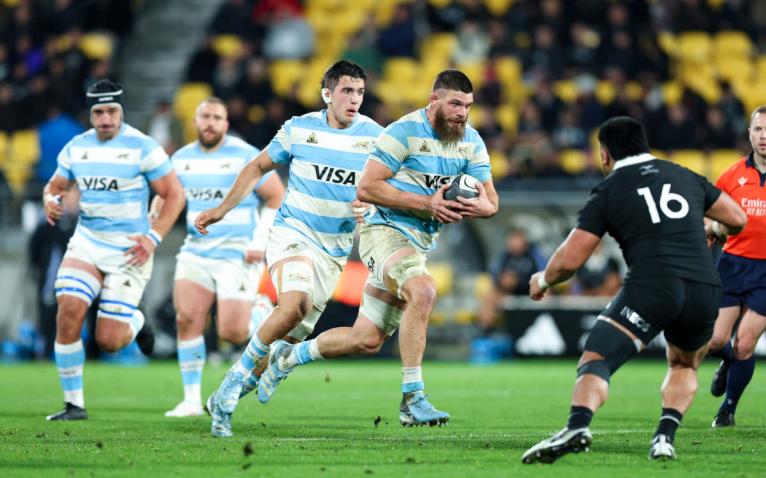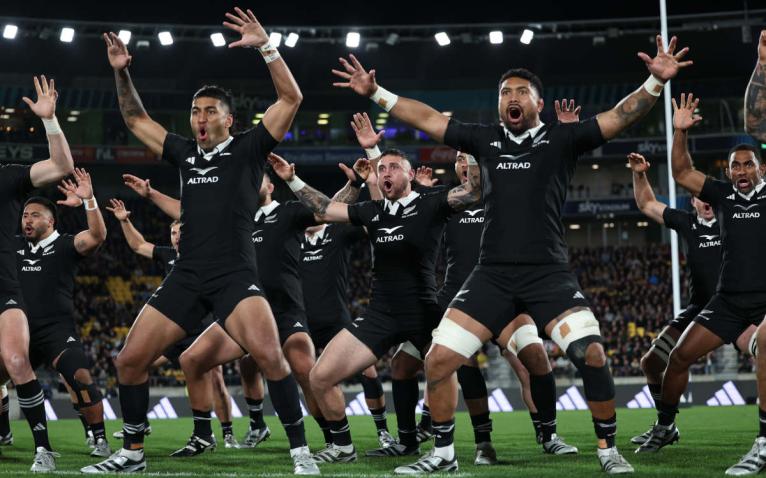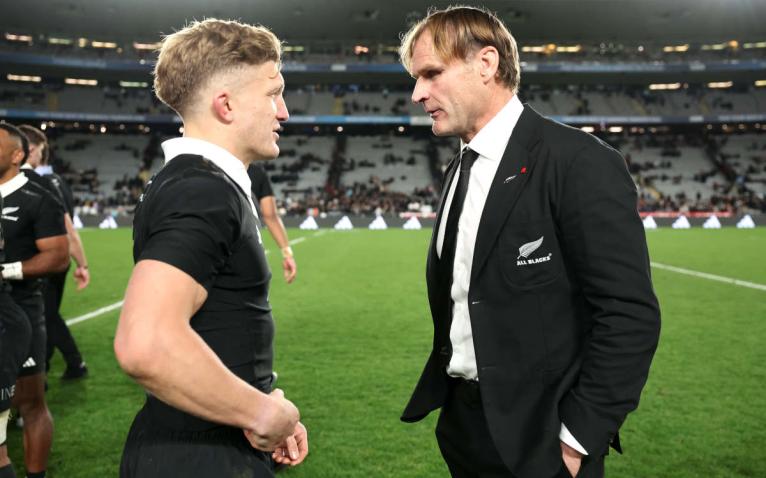No need for All Blacks to hit the panic button after shaky Robertson start

The Razor era has not started with the transformational rugby and dramatic performances many were forecasting.
Built as the Messiah who was going to liberate the All Blacks from their supposedly predictable attacking patterns of the last decade or so, Robertson has so far presided over two scratchy and, in truth, fortunate wins over England, a predictable romp against a travel-weary Fijian side and a surprising home loss to the Pumas.
This is not how it was supposed to be – either in terms of results or performance and the 38-30 loss to Argentina, played with 8,000 empty seats in the stadium, has left questions hanging over not just the new coaching regime, but the overall health of New Zealand rugby.
A home test against Argentina was supposed to be a relatively soft opportunity for the All Blacks to put their bumpy start to 2024 behind them, show that they had come to grips with the new ideas of the coaching team and lay down a significant marker that said they were ready to storm the Rugby Championship.
But after 80 minutes, there was only more confusion and uncertainty about where this All Blacks team is heading, how they are trying to play and what sort of coaching tenure Robertson is going to preside over.

The All Blacks spent long periods playing in their own territory against the Pumas. Their basic skill execution was lacking in accuracy, their game management was erratic and once again, their lineout fell apart albeit this time it was only in the last 20 minutes after they had taken off Codie Taylor and replaced him at hooker with Asafo Aumua.
The forwards lacked ball carrying punch and while the tackle execution was high, there were few dominant hits to derail Argentina’s momentum.
The regulation win and coming of age moment that everyone thought they would see in Wellington didn’t happen and the unanimous view is that the All Blacks of 2024 have shown little innovation.
They have built no real sense of identity or laid down a strong marker about what type of rugby they are trying to play.
Few things frustrate a coach more than players not delivering to brief, and Robertson all but said after the defeat to Argentina that the gameplan dreamed up in training was not the one put on the park.
Four tests into the new era and everyone is waiting to see something they like or lights a fire within them. Instead, the rugby has been a mad mix of poor exit strategies, wild kicks to no one a malfunctioning lineout and everything the All Blacks have done has been riddled with basic errors in their pass and catch.
Far from bringing the promised revolution, Robertson has made half the nation nostalgic for his coaching predecessors to be returned to post because at least, by the end of their tenure, the All Blacks were playing a simple, direct and effective brand of rugby that was easy to understand.
Robertson is clearly as frustrated as the New Zealand public. He’s had to bang the same drum three times now about poor skill execution and in three of his four tests he’s had to explain to the media that his players didn’t follow the gameplan they were supposed to.
Few things frustrate a coach more than players not delivering to brief, and Robertson all but said after the defeat to Argentina that the gameplan dreamed up in training was not the one put on the park.
“We had moments,” said Robertson the day after the All Blacks opened their Rugby Championship campaign with what was only their third home defeat in the history of the competition.
Watch the highlights right now! https://t.co/5RoumPSce1
— Sky Sports Rugby Union (@SkySportsRugby) August 10, 2024
“The first 20, you thought, ‘here we go’. How did we end up losing that game? A couple of skillset errors and a bit of game-management stuff, and we could have dealt [better] with a bit of the frustration.”
Of particular focus in regard to the untidy game management, was the All Blacks contestable kicking strategy which was poorly executed and overdone.
It played directly into Argentina’s hands, giving them the ball back in places where they wanted it, and it even directly delivered a try just before half-time when Sevu Reece patted back a clearance kick by Damian McKenzie that went to no one.
With a lack of controlled and astute game management, and a wildly erratic kicking strategy have been identified as two of the biggest contributors to the defeat, questions have inevitably arisen about the short-term future of McKenzie in the All Blacks No 10 jersey.
“I’m not going to smooth that over,” Robertson said of his side’s kicking strategy and execution.
“We did some really good stuff against England around the kicking game and the contestable high ball battle. We didn’t do that part of it last night and it cost us in the end.
“The tap-back ball and unstructured stuff we fed them, that’s the part that hurts. They took those opportunities and managed the clock in the last 10 minutes, so well done to Pablo and his crew.”
With a lack of controlled and astute game management, and a wildly erratic kicking strategy have been identified as two of the biggest contributors to the defeat, questions have inevitably arisen about the short-term future of McKenzie in the All Blacks No 10 jersey.

The Chiefs maestro has started all four tests of 2024 at No 10 and hasn’t yet delivered anything that would rank as commanding or authoritative.
He’s had a few typically brilliant individual moments, where his speed has taken him past defenders and made holes for others, and a couple of brilliantly executed cross-kicks have set up tries.
And his work under the high ball in the backfield has been consistently brave and accurate. McKenzie, though, hasn’t yet given any sense that he’s building towards becoming the sort of strategic general the All Blacks want, or if he is, he’s doing it almost imperceptibly.
His kicking out of hand has lacked accuracy and against Argentina, the All Blacks couldn’t find an effective way to exit their own 22, and so McKenzie has to carry the can for too much rugby being played in the wrong part of the field.
But Robertson appears to be determined to ensure everyone knows McKenzie has his full support.
Robertson is acutely conscious how the previous All Blacks regime could never commit themselves to backing Richie Mo’unga. The former Crusaders No 10 was in and out of the role throughout the last World Cup cycle – constantly being replaced by Beauden Barrett and it dented his confidence.
“Damian has some ‘helluva’ moments, doesn’t he?,” proffered Robertson. “He had some class touches with the chip kick and his short passing game is really good,” Robertson said. “He’ll grow as a game manager. That’s the biggest area. You’ve got to back him. He’s learning along the way. It seems that the decision has been made to play the long game with McKenzie and keep picking him and keep publicly backing him, not quite regardless of how he plays, but certainly as long as there is a reasonable basis to say he’s developing in line with expectation.
And this is because Robertson believes that it is a process building an international No 10. He said that much after the first test victory against England when some of the English media wanted to know his thoughts about Marcus Smith.
“There’s a lot on your plate and it takes time to understand test footy and the pressure of it,” Robertson said of the position.
“History shows that, you know, it’s time on the field and your feet learning a couple of lessons.”
Robertson is also acutely conscious, too, how the previous All Blacks regime could never commit themselves to backing Richie Mo’unga.
The former Crusaders No 10 was in and out of the role throughout the last World Cup cycle – constantly being replaced by Beauden Barrett and it dented his confidence.

It was only midway through 2022 that Mo’unga won the full support of former All Blacks coach Ian Foster and was consistently picked in the role, and Robertson obviously doesn’t want to go through something similar with McKenzie.
The All Blacks are trying to foster competition for places and Robertson has shown that by making selection changes such as dropping Rieko Ioane, but there seems to be an argument that No 10 is off limits on the basis it would likely prove counter productive to pressure McKenzie through the fear of being axed.
McKenzie has spent most of his new career at fly-half behind a pack that has been under pressure and whatever changes Robertson makes in search of rebuilding his All Blacks, it’s unlikely that will include switching out his chosen No 10.
And so too would it be unfair to attribute too much blame on the lack of cohesion to date at McKenzie’s door despite him being the tactical general.
The bigger issue for the All Blacks has been the lack of quality possession produced by the forwards and their inability to build the critical momentum that affords the decision-makers the time and space they need to pull the strings.
McKenzie has spent most of his new career at fly-half behind a pack that has been under pressure and whatever changes Robertson makes in search of rebuilding his All Blacks, it’s unlikely that will include switching out his chosen No 10.
































So when do we panic? When they lose on Saturday? When they lose the Rugby Championship?
Foster was never given full support from NZR even though they appointed him. Robertson was always in the shadows and a failed coup wouldn't have helped confidence. In light of this the AB tenure for Foster was remarkably successful and surprisingly was devoid of bitterness, outbursts or retribution.
Will Robertson be as balanced or will we see another Wayne Smith AB coaching episode?
34% gain line success for the ABs tells you everything you need to know about where the problems are and what changes need to be made. Matera, Kremer, and JMG dominated.
Stick with the same back row and let them answer those questions, or bring in new guys who are better suited? - Cane and Finau in for Dalton and Blackadder?
IMO Finau has way more of a future at 6 than any of the other options we have. Another strong ball carrier to take some workload off Ardie, a strong defender, and a good line out option.
I agree. There’s no need to hit panic buttons at least not until after next Saturday.
Another loss and the whole of New Zealand will turn into one large panic button.
🚨
Among other things, the ABs are going to have to work really hard on pushing through the pressure they will be feeling going in to play Argentina at Eden Park. They HAVE to win. NZ fans are largely writing off the prior loss to a “once off anomaly”, part of the rebuilding phase and are calling for the ABs to thrash them. Pressure!!
But it comes with the AB jersey. Deal with it.
The Argies will have their tails so high up at the opportunity to make history at Eden Park, it’s not going to take Contemponi much to get them up for the game. If they can channel that, execute well and remain calm…
Tasty. Tasty.
Argentina by 3 points. Eish wena. 🚨
I find the comments about the ABs not sticking to the game plan interesting. They’ve not looked like the ABs of the past who respond well to pressure since before Bombela. All very uncharacteristic! That’s where they’re most vulnerable right now.
Dmac can do things no other 10 can do, he’ll get there and Razor is right to back him.
Whole sale changes will not sort out connections or combinations, it’s hard for players to shine when the key basics aren’t being done by others around them.
I agree with a few pundits around bring Clarke in to assist the forwards with some gainline carries, Tosi off the bench perhaps.
Would like to see Jacobson or Finau at 6 as Blackadder for all his fanfare, doesn't go close to being a hard ruck hitting, abbrasive ball carrier people seem to think he is. Give Finau the green light to run the ball and hit people hard, he's tough and will be a good player once he finds his feet.
So much for the Razor edge... Of course its time for change. BIG change!
Ignoring retires, OSs & injured this is almost the same spluttering ABs since 2019.
Scrapped past a 5th ranked [& that’s flattering] England, then
spluttered & ‘leaked like a sieve’ ( ‘in NZ record ‘ of 38 points! Dysfunctional!!) against 7th ranked Pumas.
10th ranked Fiji match is fun but irrelevant.
The question is why the NZ reaction against the Razor, Ryan, Hansen ABs performance isn’t harder.
AB reaction so far…
disappointed feelings. Give us a break, ya not Taylor Swift.
Worse, Hansen stated THOSE FOSTER WORDS (said in LordoRings Precious tone…) LEARNINGs!! OMG ABs are in trouble.
For all the talk of the innovative ways of Razor the squad is VERY conservative & Unrejuvenated …. Enough to make Foster look radical.
Hopefully, Razor will see the error of his ways & REselect the squad.
… ie
1 {de Groot}/ Bower
2 {Taylor }/ Riccitelli
(A.Aumua - error rate! HURRY back ST!!)
3 {Newell}/ Lomax (L- if repeat 1st Puma try ball rip loss-gone)
4,5 Locks {Vaa’I, Darry ], ( quick, P.Tuipulotu, S.Barrett)
6,7,8 Loose forwards { Sititi, A.Savea, H.Sotutu}/ Peter Lakai / S.Finau
(Blackadder- work rate does not equal effectiveness- not to standard )
9 { Ratima}/ Christie
( TJ, Gone! OMG his defensive error rate! Enough chances! Eg 2nd & 3rd Puma try )
10 {D.McKenzie}/ Plummer (Dmac – repeat error rate & your gone. Enough chances!!)
11 {S.Reece} / C.Clarke (?? 2nd Puma try Reece’s error?! Was ‘fighting for the ball’! TJ & B.B? watching!)
12 {J.Barrett}/ Q.Tupaea
13 { Proctor} / Etene Nanai Seturo
(ALB- Gone! Defensive errors. Enough chances!.. Eg 1st , 2nd Puma try)
14 {Narawa}/ Tele’a
15 {W.Jordan }/ Love
Razors undoing will be that the NZ public don’t give him a chance to rebuild.
Rassie had it easier in that he took over at the boks lowest point. There was nowhere to go but up and losses along the way were accepted.
The ABs have been tinkering around their lowest point since Bombela. They still have to go there I reckon. But the NZ public have been having like Foster was the low point and that Razor was going to run there ABS into the winning machine like the crusaders. Not realistic.
NZ should accept a 60-70% win ratio and give Razor some breathing room. Get behind the project and love him like we love Rassie. So much love.
Or fire him now and see what the lowest point looks like.
ALB is one of our best backs at the moment and he was the only One in position during that first try, no one was connecting from the inside and supporting him. Dalton just stood there. Funny that you want Jordie barrett in there who offers absolutely ZERO on attack.
"McKenzie has spent most of his new career at fly-half behind a pack that has been under pressure and whatever changes Robertson makes in search of rebuilding his All Blacks, it’s unlikely that will include switching out his chosen No 10." ...and that sums it up 100%